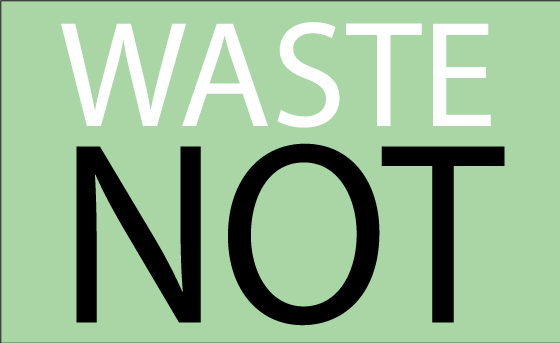Waste Not
More stories from Lara Bockenstedt

Some basic rules of the zero waste lifestyle: no take-out containers, coffee cups, or plastic water bottles. Absolutely, under no circumstances, is non-recyclable packaging allowed.
These are rules I have subscribed myself to this semester in a move to take responsibility for my environmental impact.
Author and conservationist Aldo Leopold wrote, “There are two spiritual dangers in not owning a farm. One is the danger of supposing that breakfast comes from the grocery, and the other that heat comes from the furnace.”
When I go to the grocery store I’m on a mission, armed with a list and budgeted time frame. Not once have I considered where the packaging I see decorating each food item comes from … or where it may end up.
Growing up, my dad was strict about reducing and recycling. If something was put in the trash that was meant for recycling, he would call me or my brother over to explain why the material belonged in the recycling bin, subsequently having us move it. Our backyard boasted a garden with a compost bin to turn our waste back to dirt and we were encouraged to ride our bikes instead of using the car.
His wisdom didn’t click for a few years, until I realized how senseless people were about consumption.
I saw people buying plastic water bottles in bulk only to toss them in the trash. Shopping was a matter of purchasing brands because they were affordable, even if they were produced unethically. I saw spontaneous purchases and plastic baggies discarded instead of reused.
All this, I critiqued while continuing similar vices, a hypocrite willing to get angry while downing coffee from a styrofoam cup. I realized that each day we subconsciously witness and participate in needless rituals beginning with using a product and ending with tossing it in the trash.
Californian Bea Johnson claims she was the beginner of the zero waste movement. She, her husband and two kids can fit over two years worth of trash into a quart-sized glass jar. To the naysayers of the world, she has evidence her family has cut spending and that the lifestyle doesn’t require time consuming effort either.
“For me, the zero waste lifestyle is not about complicating your life,” she said in an interview with CCTV. “It’s about simplifying it.”
The average American produces over a ton of trash each year, according to a recent World Bank report. Everyday, around 4.3 pounds of waste is tossed in a landfill with no chance of decomposition.
These are alarming statistics, but the crisis is a concept we’ve become desensitized to. Individually, the only battle many Americans fight is a pittance effort of recycling. As a result there are scientists in the trenches coming up with better ways to dispose of trash. But isn’t it more efficient to change lifestyle habits rather than clean up mistakes?
“We vote with our dollar,” my dad says, and it’s high-time I exercise my responsibility to this planet and lived my values. This semester, I will be exploring sans plastic options in the fashion, home and lifestyle worlds.
I’m not saying it will be possible to fit all my trash from the semester into a tiny mason jar. But by taking steps to minimize and analyze daily habits, my vote on the future of our natural landscapes and wildlife will be cast.

